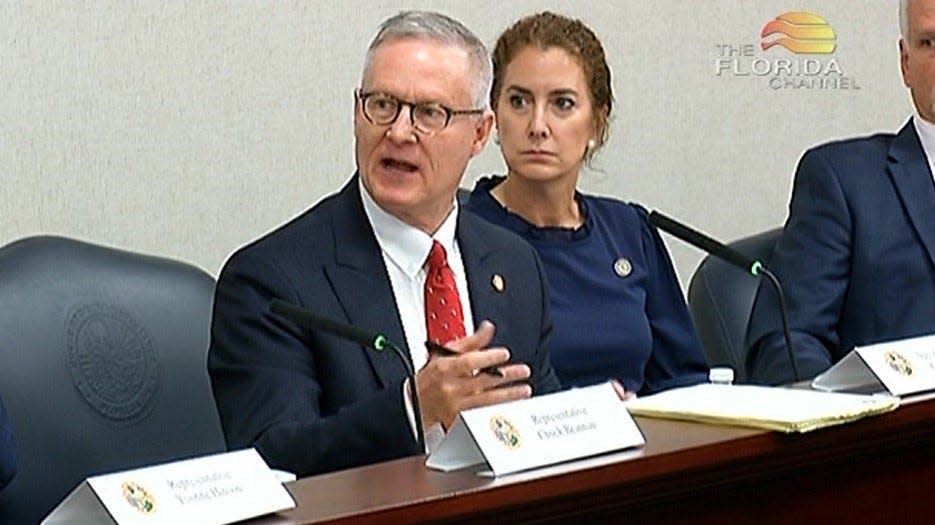Controversial GRU takeover bill filed in Legislature. What happens now?
- Oops!Something went wrong.Please try again later.
An expected controversial bill that would take a municipal-owned utility from city officials' control has officially been filed in the Florida Legislature.
State Rep. Chuck Clemons, R-Newberry, formally filed House Bill 1645 Monday. The five-page bill would strip away all utility decision-making abilities from Gainesville commissioners and place it in the hands of a board appointed by Gov. Ron DeSantis.
Though several unsuccessful attempts have been made in the past by Clemons and state Sen. Keith Perry, R-Gainesville, the new bill has seen more momentum and support among the Republican-majority local delegation.
Clemons argues the City of Gainesville and its utility, Gainesville Regional Utilities, are facing a financial crisis, with $1.7 billion debt and ever-increasing utility bills.
"This is about the long-term stability of the people’s utility," Clemons said in March.

While much has been made of the public utility, state lawmakers have widely ignored how it stacks up against other utilities.
In February, lawmakers on the Joint Legislative Auditing Committee discussed an Auditor's General report looking at the city's finances. Among the findings was the city's overall debt, $1.2 billion of which falls on the utility side.
About half of that comes from the purchase of the biomass facility, a decision JLAC members also criticized but one that saved taxpayers nearly $900 million over three decades. They also highlighted how the debt has resulted in credit downgrades. City leaders had no answer when asked what the city's long-term solution to pay off the debt was.
But GRU's overall debt, mixed with the range of services provided, makes it unique compared to most municipal-owned utilities. GRU doesn't supply the University of Florida with all of its power, as Tallahassee does with Florida State University. Furthermore, a majority of property in the city is also off the tax rolls.
Still, GRU maintains a top-tier credit grade from all three major rating agencies, higher than Florida Power and Light and Duke Energy.
Earlier coverage: Lawmakers pass first vote to take utility away from Gainesville's elected leaders
More GRU: Lawmakers grill Gainesville officials over utility management, debt
Opponents of Clemons' bill say it is just another attempted Tallahassee takeover that paints similarities to Disney's Reedy Creek and one that overrides the will of the people who previously rejected a referendum to create a GRU board in 2018.
"I'm disappointed that the bill, as originally filed, doesn't include any amendments from the various organizations and individuals who I know have reached out to Rep. Clemons' office," Gainesville Mayor Harvey Ward said. "But I choose to believe that Rep. Clemons was forthright in his request for local input on this bill and I look forward to something that is beneficial to the people that he and I serve."
Ward also added that he was disappointed in some of the rhetoric he's seen Clemons use with local media outlets when describing the city's financial situation, but added that he understands the Newberry representative is under "a tremendous amount of pressure" from others and looks forward to working with him to alleviate concerns.
Clemons has said publicly that the city is on the brink of bankruptcy, though there is no indication that is it, and described the transferring of funds from the utility to city government as "malfeasance."
Unlike how other bills are typically filed in the Legislature, Clemons brought forth a drafted version in March during a public hearing in Tallahassee with the local delegation, which passed 4-1. Dozens of locals drove to the state House to speak on the issue. State Rep. Yvonne Hayes Hinson, the only Democrat in the local delegation, voted against it.

What does the bill say?
Under Clemons' proposal, the five-member board will be appointed by the governor. The new board would have the ability to make any decision for GRU, including hiring and firing the general manager.
The City Commission would no longer have the ability to make GRU-related decisions.
A second, 14-page version of the bill was published by WCJB-TV20 early Monday morning prior to it being formally introduced and released to the public. It is vastly different from the one formally filed on the Florida Legislature's website. Its origins and authenticity are unclear as of Tuesday.
Who gets appointed to the board?
While Clemons has stated that all members of the board must be Alachua County residents and GRU customers, the filed five-page bill doesn't explicitly state that.
Under the originally filed version Monday, one member "shall be a residential customer with substantial knowledge of GRU, its operations, and its history." It doesn't say the person must be a Gainesville resident or that they have to be a GRU customer.
Another member would be a major commercial electric user or be the owner of a company that uses "at least 10,000 kWh per month of electric usage during each of the previous months." Again, it doesn't specify that the person has to be a GRU customer.
An additional three members "shall be competent and knowledgeable in one or more specific fields substantially related to the duties and functions of the authority, including, but not limited to, law, economics, accounting, engineering, finance, or energy."
If GRU's customer base serves more than 40% of its customers outside Gainesville limits, then the governor must appoint a second board member who also lives outside city limits.
The bill provides the first time in Gainesville's history that a resident outside city limits would have a say or vote in GRU-related matters.

Could GRU be sold off?
City officials, including the previous mayor, Lauren Poe, have said that major utility providers like Florida Power and Light and Duke Energy have been increasingly interested in GRU's territory and believe they are behind the constant push to remove the commission's control.
While lawmakers − some of whom have accepted tens of thousands in campaign donations from FP&L and Duke − have stayed mum on the subject, the new board would have the ability to sell off any utility asset. The issue becomes tricky, however, as the city's charter says any such decision must go before the voters.
Will this make bills go down?
Nothing in the bill specifically states that it will help reduce electric bills for GRU customers.
In February, the Florida Municipal Electric Association released a bill comparison report that shows Duke Energy having higher bills than GRU. It also shows that GRU was only about $2 higher than Florida Public Utilities, but almost $50 higher than FP&L.
Since then, however, the city lowered its fuel charge by about $15 a month, placing it closer to the investor-owned utility average and lower than several other municipal utilities.
Will board members be paid?
No. Unlike a previous version of the bill that failed by a veto from then-Gov. Rick Scott, members of the board would be volunteers.
Are there term limits?
The current version of the bill has no detailed term limits for the five-member board. Members will be appointed to staggered terms during the first iteration of the board, before being given four-year terms. There is no limit on how many times someone can be reappointed.
What happens now?
The bill was introduced before a committee and given a first reading. The state website doesn't say whether a vote was taken or what committee. The bill will need to pass one or two committees before being voted on the floor of the House and Senate, prior to reaching the governor's desk.
Correction: This article has been updated to show that Gainesville is about $2 higher than Florida Public Utilities.
This article originally appeared on The Gainesville Sun: Chuck Clemons files GRU takeover bill in Legislature. What now?

